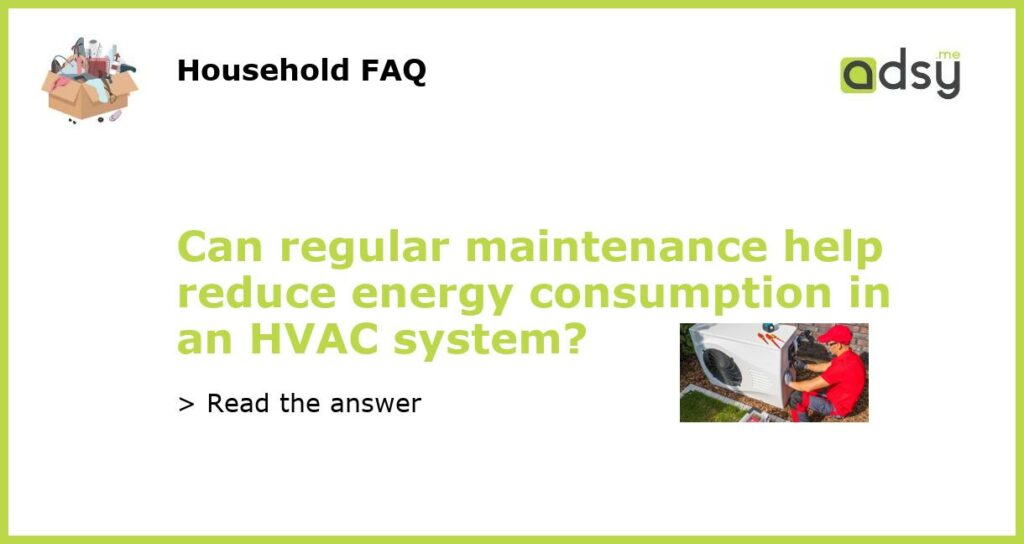Finding the Right Answer: Can regular maintenance help reduce energy consumption in an HVAC system?
The Importance of Regular Maintenance in HVAC Systems
Regular maintenance plays a crucial role in ensuring the optimal performance and energy efficiency of an HVAC (Heating, Ventilation, and Air Conditioning) system. By conducting routine inspections, cleaning, and tune-ups, HVAC professionals can identify and address any issues or inefficiencies in the system that may be affecting energy consumption.
One of the primary reasons for conducting regular maintenance is the prevention of system breakdowns and costly repairs. By identifying and addressing potential issues early on, technicians can prevent major failures that could result in a complete system shutdown or the need for expensive replacement parts. This is especially important in older HVAC systems that may be more prone to wear and tear.
Additionally, regular HVAC maintenance helps to extend the lifespan of the system. By keeping all components clean and functioning properly, system efficiency is maintained, reducing the strain on individual parts and the overall system. This can significantly increase the lifespan of the equipment and delay the need for replacement.
The Relationship Between Maintenance and Energy Consumption
An HVAC system that is not regularly maintained can experience decreased efficiency, leading to increased energy consumption. Over time, dust, dirt, and debris can accumulate on various components of the HVAC system, such as the filters, coils, and fans. This buildup can restrict airflow and force the system to work harder to heat or cool the space.
When an HVAC system is operating under strain, it requires more energy to achieve the desired temperature. As a result, energy bills can increase significantly. By regularly cleaning and maintaining the system, HVAC professionals can remove this buildup and allow for better airflow, improving energy efficiency and reducing overall energy consumption.
Maintenance Tasks to Reduce Energy Consumption
There are several maintenance tasks that can be performed to help reduce energy consumption in an HVAC system:
Regular filter replacement or cleaning: Dirty filters can restrict airflow and force the system to work harder. It’s recommended to clean or replace air filters every one to three months, depending on usage.
Coil cleaning: The evaporator and condenser coils can accumulate dust and dirt, reducing their ability to transfer heat effectively. These coils should be cleaned annually to maintain optimal performance.
Ductwork inspection and sealing: Ducts with leaks or poor insulation can lead to energy loss. Inspecting ductwork and sealing any leaks can help to ensure that conditioned air reaches its destination effectively.
Lubrication of moving parts: Regular lubrication of motors, fans, and other moving parts can help to reduce friction and increase operational efficiency, resulting in lower energy consumption.
The Financial Benefits of Regular Maintenance
While the primary goal of regular maintenance is to optimize system performance and energy efficiency, there are financial benefits as well. By reducing energy consumption, HVAC systems can lead to lower utility bills, resulting in cost savings for home and business owners. The energy savings from regular maintenance can often offset the cost of the maintenance itself, making it a worthwhile investment in the long term.
Additionally, regular maintenance can help to identify small issues before they become significant problems, preventing expensive repairs or system replacements. By addressing these issues early on, the overall cost of system ownership is reduced over its lifetime.
Conclusion: The Role of Regular Maintenance in Energy Efficiency
In conclusion, regular maintenance is a critical component in reducing energy consumption in an HVAC system. By conducting routine inspections, cleaning, and tune-ups, HVAC professionals can keep systems running efficiently and prevent breakdowns or costly repairs. Regular maintenance tasks, such as filter replacement, coil cleaning, ductwork inspection, and lubrication, can improve overall energy efficiency and result in financial savings for home and business owners. Ultimately, investing in regular maintenance is an effective way to optimize the performance and energy efficiency of HVAC systems.

